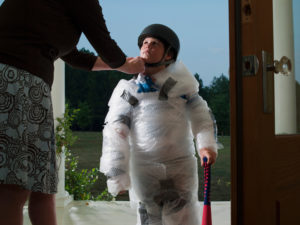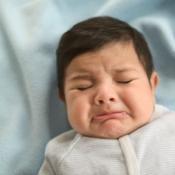 A child changes everything. As a parent, you start seeing things from a completely different perspective. Whereas you would not have bothered before about cars driving too fast on a suburban street, now you find yourself yelling out, “Slow down, there’re kids in this neighborhood!”
A child changes everything. As a parent, you start seeing things from a completely different perspective. Whereas you would not have bothered before about cars driving too fast on a suburban street, now you find yourself yelling out, “Slow down, there’re kids in this neighborhood!”
Being a parent brings on a new sense of responsibility. At least one study shows that dads start spending more time at the office after having a child, working harder, hoping for a promotion. Another group of studies show that stress increases significantly for new parents, and some even suggest that, because of the added stress, parents are not much happier than their childless counterparts.
Ah, responsibility. You hold that little bundle of sleepless joy in your arms, and tell them, “I will never let anything happen to you. I promise. I will dedicate my life to you, and you will be the happiest person to ever walk this earth.” However, raising the smartest, happiest, and most amazing human being is a lot of work. Just keeping a child alive is huge responsibility!
The constant pressure can lead you to over-parent your child. Your desire to shield and protect them at all times allows the child little room for making mistakes.
Children, and people in general, learn best from experience. If a parent constantly guides a child to assure the child’s success, then the child may not know what to do when left to their own devices.
A common sign of over-parenting is when parents express worries in the form of instructions. For example: “Don’t fall!” How does that statement reduce the child’s chances of falling? Another one: “Be good.” Instead of helping your child succeed, these vague statements communicate mistrust in the child’s abilities.
Another sign of over-parenting is when a parent rushes in to fix a child’s problems to avoid the child becoming upset. When a child loses a toy, they get a new one. When a pet dies, and parents are overwhelmed with their child’s feelings of grief, they might rush to the pet store for a new animal to replace their child’s best friend.
So, what’s a loving parent to do? What if the parent has a superpower to foresee danger. Should the parent not give warnings? Step in to save the day?
Here are some suggestions on how to step back so your child can step up:
- Keep your fears in check. Having a child feels as if your heart is walking around outside your body—all you want to do is keep it safe. Instead of expressing your fears to your child, give things a positive spin. “Wow, those are a lot of heavy plates you are holding!” builds your child’s confidence. If your child needs help, provide specific suggestions. “Hold the plates with both hands” may be enough. If you find yourself providing too much anxiety-filled feedback, you may be overdoing it.
- Think about the realistic worst-case scenario. Fear keeps us safe. That’s why fear makes us think about the worst that could happen. But how hurt can your child really get if they run too fast or swings too high? How sick can they become from playing with someone who has the sniffles? Give your child room to learn their own limits. The child may need to fall once or twice to find out.
- Allow your child to experience upset feelings. Although you want to raise the happiest kid, your child will experience disappointment, frustration, and grief. When you experience these feelings, you don’t usually want someone to just fix it. It helps much more to be listened to and feel “felt.” Let your child tell you about their feelings. Connect with the child without immediate suggestions or solutions. For your child, it is often more important to know you are available than it is to know you will fix all of their problems. And, learning to remain calm when things aren’t going well builds the child’s stress tolerance.
Above all, remember that your child will benefit from learning to figure things out. A child will be more careful holding an ice cream cone after dropping it once. And if it’s their emotional well-being you are looking out for, keep in mind that the way in which your child is able to overcome difficulties is what will make them feel successful and empowered. Our children are often stronger, wiser, and more responsible than we think.

The preceding article was solely written by the author named above. Any views and opinions expressed are not necessarily shared by GoodTherapy.org. Questions or concerns about the preceding article can be directed to the author or posted as a comment below.

 8 Surefire Ways to Help Your Child Overcome Bullying
8 Surefire Ways to Help Your Child Overcome Bullying Your Move, Parent: What to Do When Your Teen Is Cutting
Your Move, Parent: What to Do When Your Teen Is Cutting Break Bones? No, but Name-Calling Can Injure Self-Esteem
Break Bones? No, but Name-Calling Can Injure Self-Esteem

